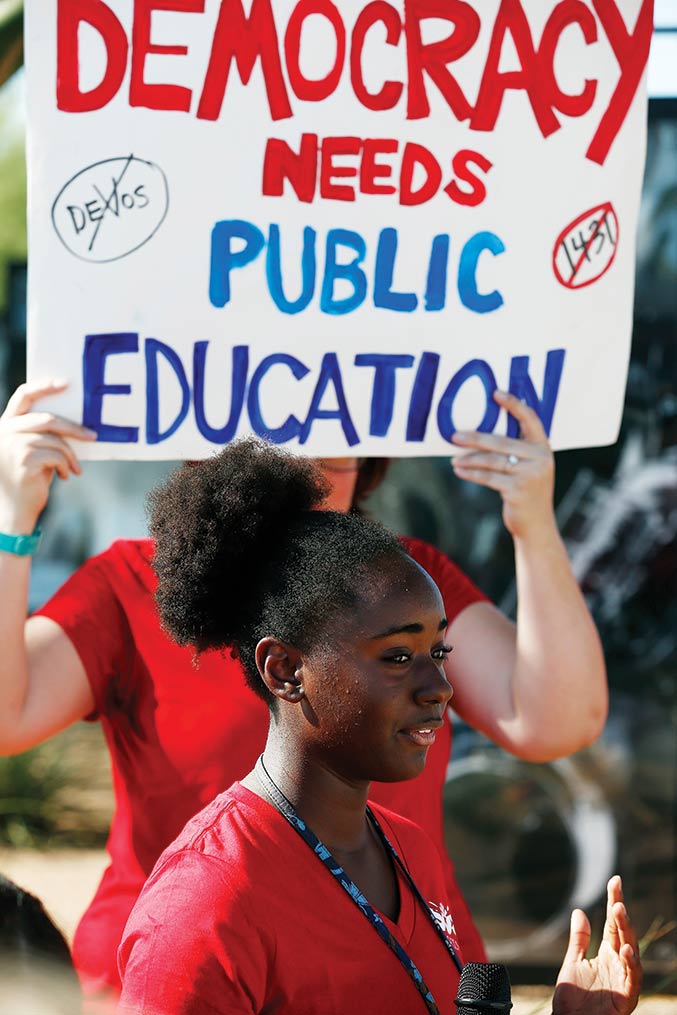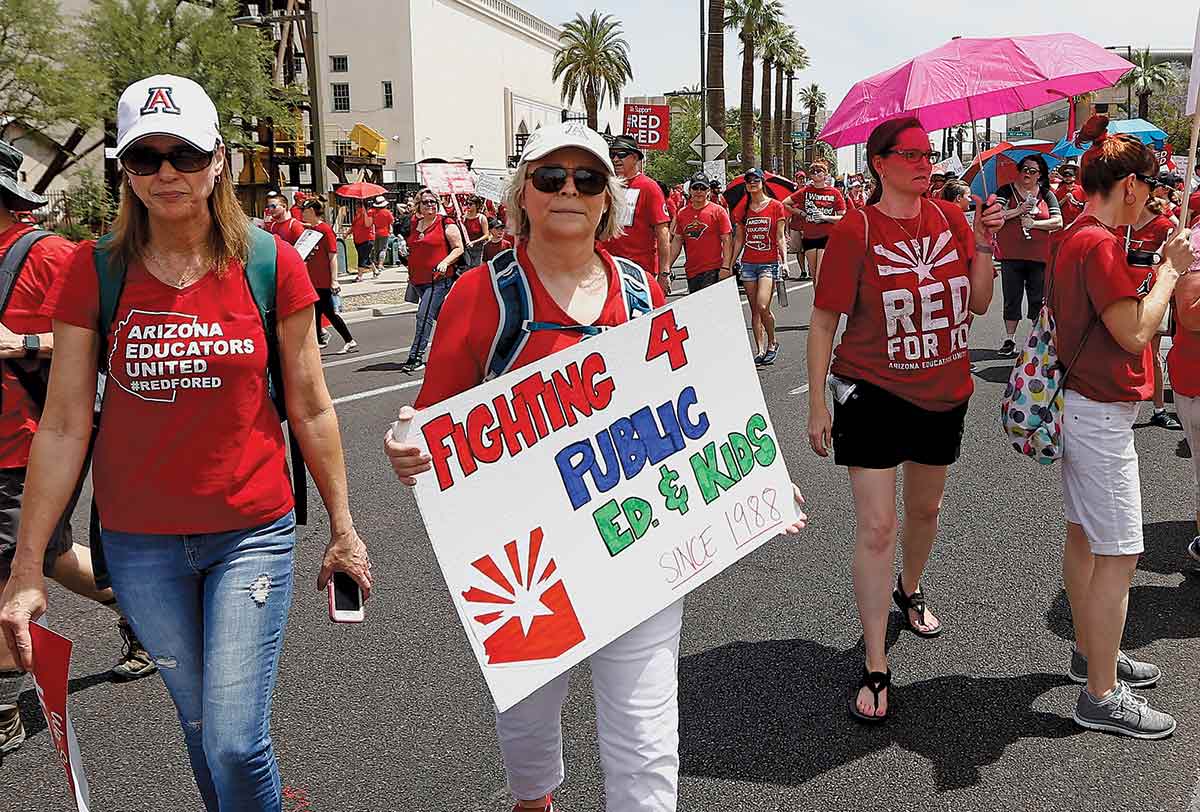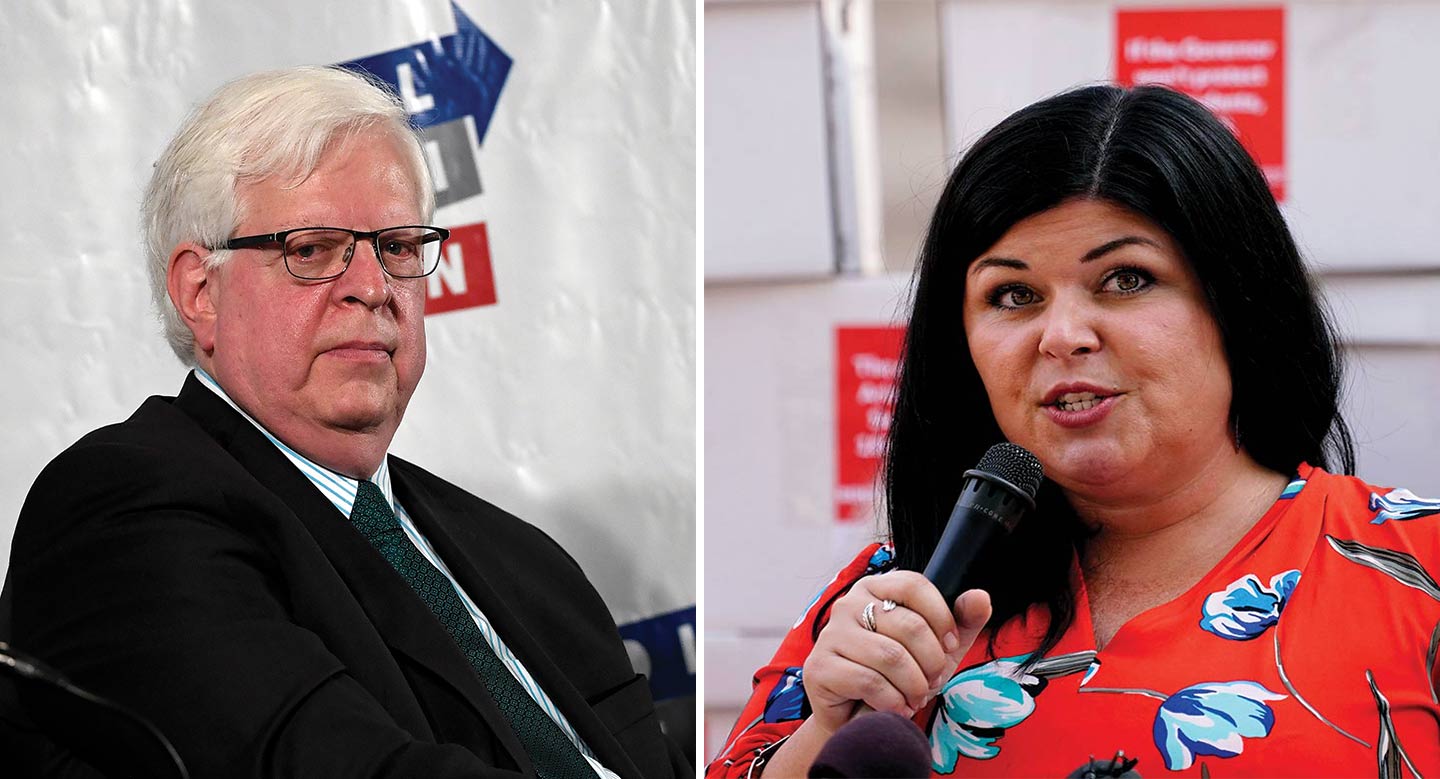Why “Fund Students, Not Systems” Is a Recipe for Disaster
When the “Race to the Top” becomes winner take all, students are the big losers. And as the stakes grow higher and higher, public education falls further behind.

In Newton, Massachusetts, the signs of competition in education are everywhere. Ads in storefront windows promise to boost SAT scores, enrich students with specialized math and science skills, or help them craft the essay that will gain them an edge in college admissions. After-school STEM programs train students as young as 7 in coding, robotics, and animation—promising anxious parents a leg up in the race to acquire 21st-century skills. “STEM-related learning is the key to the bright future of our children,” declares one such edu-preneurial venture. Meanwhile, an army of private tutors offers to supplement what students learn in school.
An affluent community outside Boston, Newton is known for its excellent schools. Students here go on to college at a rate that far outpaces the state average, and the district sends an enviable number of graduates to Ivy League universities. For a growing number of parents here, though, just knowing that their children attend a good public school is no longer enough. When admission to a highly selective college hangs in the balance, parents are willing to do—and pay—whatever it takes to secure an advantage for their kids.
As recently as the 1960s, less than 10 percent of the American population had completed four years of college; for Black Americans, it would take another three decades to reach that figure. Even as late as 1993, when Bill Clinton took office, only 22 percent of adults possessed a four-year college degree or higher. But Clinton and his band of so-called New Democrats argued that college was for everyone. As they framed it, higher education was the key to competing for jobs in the modern economy.
Within a decade, nearly 30 percent of American adults had completed four years of college. Ten years later, that figure was up to 32 percent. By 2021, 38 percent of adults had a college diploma, with 14 percent earning an advanced degree. Though the rates of degree attainment among Black and Hispanic Americans still lagged, those figures nearly doubled for Hispanics and substantially increased for Black Americans between 2000 and 2021.
By the time Barack Obama took the oath of office, it was a Democratic Party mantra that education—with a particular emphasis on obtaining a college degree—was the solution for poverty and economic inequality. According to the Obama White House, earning a postsecondary degree was “no longer just a pathway to opportunity for a talented few.” Instead, it was now “a prerequisite for the growing jobs of the new economy.” “Go to college or you’ll be a failure” was the essence of the message.
Popular
“swipe left below to view more authors”Swipe →It’s a radical vision in which schools no longer function as community institutions. And yet the reason we are now so vulnerable to such a contorted policy prescription is that we no longer talk about education as something that benefits all of us. Our widespread acceptance of schooling as a consumer good (and parents as customers) can make it difficult to push back against proposals that aim to unmake public education entirely.
Yet expanding enrollments in higher education began to erode the value of a college diploma, just as rising high school completion rates half a century earlier had reduced the relative value of that credential. One consequence was an uptick in applications to graduate schools. Another was that it began to matter more and more where you went to college. Meanwhile, widening economic inequality heightened anxiety among parents. The high-stakes race to get into the right college (and perhaps the right graduate school after that) had cascading effects across the education system, spawning an entire industry of consultants and companies, all promising an admissions advantage.
Politicians may have convinced themselves that the rising tide of education would lift all boats, but middle-class and affluent families know better. They understand that their children’s education, defined this way, is what economists call a “positional” good: Any individual’s gain must come at someone else’s expense. The result is a system that increasingly separates winners from losers along the lines of academic achievement, to disastrous effect.
In his 2019 book The Meritocracy Trap, Daniel Markovits argues that the battle for elite credentials exacerbates inequality, hampers social mobility, and makes even the so-called winners of the educational arms race miserable. “Today, middle-class children lose out to the rich children at school, and middle-class adults lose out to elite graduates at work,” Markovits writes. The quest to prove one’s “merit” through education is a rigged game, he argues: “It blames those who lose a competition for income and status that, even when everyone plays by the rules, only the rich can win.”
The political fallout from this high-stakes battle for elite credentials has been profound, helping to fuel the populist revolt that ushered in the Trump era. The Democratic Party’s hemorrhaging of working-class voters over the past four decades was driven in part by the “college for all” messaging that seemed to blame workers themselves for their downward mobility. But this competition for educational prizes has also undermined any notion of K-12 education as something we’re all in together. When your material interests seem to hinge on maintaining a personal advantage, it’s hard to think about the public good.

Arizona is in the throes of what The New York Times has called the “ultimate experiment in school choice.” As of 2022, every student in the Grand Canyon State—including those from its wealthiest families—became eligible for a school voucher. Anywhere from the standard award of $7,200 to $40,000 in taxpayer funds can now be deposited into a so-called education savings account to be used for private school tuition, homeschooling, or other “education-related” expenses. The beneficiaries include students who have never attended public schools, whose private school tuition is now being paid by the state.
Advocates of school choice hold up Arizona as a triumph: a state where the call to “fund students, not systems” has been translated from ideology to policy. But the experiment underway in Arizona is also about radically redefining K-12 education—from a public good that benefits all of us to a private good consumed by individuals. The proponents of vouchers argue that families should be able to use taxpayer funds to purchase whatever kind of schooling they want for their children, with minimal oversight. Unsurprisingly—and even with limited information available to the public—evidence of abuse has quickly mounted. In addition to ski passes and ninja camp fees, voucher holders have tried to purchase golf simulators, expensive wristwatches, and high-end massage chairs.
Arizona’s “fund students, not systems” philosophy is also rapidly generating budget-busting costs. By 2023, nearly 70,000 of the state’s roughly 1.1 million students were enrolled in the program, which is now on track to cost taxpayers $1 billion a year. In a state that has also dramatically cut taxes in recent years, the program’s cost will soon force a painful reckoning over spending priorities. And that is almost certainly the point. For advocates of reducing education spending, the privatization of education becomes more useful the more expensive it gets. Public education advocates Charles Siler and Dawn Penich-Thacker explain: “As voucher costs explode and state revenues decrease, Arizona has very few options to balance the budget, which leaves slashing programs and services as the only viable tool in a depleted toolbox.” Privatization, in other words, begets more privatization.
But what’s underway in Arizona isn’t merely about replacing a public system with private options. The ultimate goal is to move away from any shared responsibility for other people’s children. “The defining issue here is: Do you care about other people’s kids or not?” says Beth Lewis, the executive director of Save Our Schools Arizona. The fight to save public schools, as Lewis points out, is also the fight to save a particular vision of society: “Do we want to live in a world that’s based on an understanding of a public good—or one where only the individual good matters?” Her answer is clear: “I want to live in a society where we care about other people’s kids. That’s what I’m fighting for.”

What difference does it make if we think about K-12 education as a private good? After all, we expect private citizens to shoulder the cost of higher education even though it, too, generates benefits beyond those accrued by individuals. “We extol higher education as the basis of shared national prosperity and progress,” the historian Jon Zimmerman reminds us, but “then we turn around and present students—and their families—with the bill.”
Telling parents to think of themselves as consumers engaged in a zero-sum competition for scarce resources only incentivizes them to cling as tightly as possible to their own advantages. While proponents of universal voucher schemes may seek a hyper-individualized model of schooling—one in which parents focus solely on their own children—the reality is that our current system already functions that way. Long before “fund students, not systems” became a rallying cry, parents were moving to affluent suburbs where they could maintain tighter control over their tax dollars. They were fighting to preserve the boundaries of their own school districts, imposing strict limits on who could access local schools. Many withdrew from the public schools entirely, preferring elite private schools that could offer even higher levels of distinction.
This consumer mentality has also made us susceptible to increasingly extreme policy ideas. In our previous book, A Wolf at the Schoolhouse Door, we made the case that school choice advocates envision a future in which education is “unbundled”—just as cable TV packages have been largely replaced by a custom-curated collection of à la carte shows and streaming apps. As it turns out, we were right: A growing number of state-funded education-savings-account programs now function in exactly this way, with parents encouraged to purchase their kids’ schooling, course by course and product by product, via an Amazon-like marketplace of education vendors. Kelly Smith, the CEO of the “micro-school” company Prenda, likens its business model to an Airbnb for education, with parents searching for customizable content options the way a would-be vacationer might look for a beach cottage.
Increasingly, the consumer lens with which we view K-12 education also drives debates over the content that schools teach. A raft of state laws regarding curricular “transparency” and parental rights encourages parents to opt their kids out of activities they don’t like—or subjects they don’t support. So far, such laws have been a conservative cause, tapping into the anxiety over how schools treat contentious topics like race and gender. But the growing push to incorporate right-wing content into school curricula is likely to trigger a similar movement from the left, further splintering K-12 education along political lines.
Consider, for example, the rising popularity of the Prager University Foundation, better known as PragerU. Education officials in Florida, New Hampshire, and Oklahoma have embraced this “edutainment” project, which claims to counter “the dominant left-wing ideology in culture, media, and education.” As critics have pointed out, PragerU’s social studies content is plagued by factual errors and misrepresentations, including a video that depicts the abolitionist Frederick Douglass justifying slavery as part of a necessary “compromise.”
But the real danger of incorporating blatantly ideological content into schools isn’t just the risk of indoctrination; it’s the further erosion of the public character of public schools. We make decisions about curricula on the basis of shared interests; public schools are recognized as common ground. Allowing families to pick and choose what kids learn à la carte according to their parents’ political preferences undermines this vision completely. Don’t want a school that offers PragerU civics? Opt out and attend a “liberal” school instead. Don’t want your kids learning about civil rights? Shop for a school that teaches the 1776 Curriculum from Hillsdale College, or use state voucher money to purchase a conservative homeschooling curriculum.

The objective isn’t merely to change what gets taught; it’s to change the way we understand ourselves as a public, such that the very idea of a shared institution seems impossible. And if that’s the case, then we might as well stop funding public education with our tax dollars. That’s the ultimate end game for the radical ideologues who have been working so diligently to privatize schooling. If we’re all just pursuing our own private interests, then why should taxpayers be footing the bill? It’s a distinctly 19th-century view of the future, one in which Americans buy their own schooling and the poor settle for whatever scraps they get.
If we are to preserve our schools, it must be clear that public education is for all of us. If we fail at that, we will lose our schools. And if we lose them, they won’t come back. That may sound like hyperbole, but imagine, even in less partisan times, trying to sell Americans on something as ambitious as public education. It isn’t just the price tag, which comes to the better part of $1 trillion annually. It’s also the profoundly inclusive design: Public schools are open to all and, over the past several decades, have become increasingly equitable. Moreover, the schools are publicly governed—meaning that they are an ongoing experiment in democracy and self-rule.
Right now, that experiment may seem doomed. But in defending the ideal of public education, we might awaken the collective will to do more than merely endure.
More from The Nation

Luigi Mangione Is America Whether We Like It or Not Luigi Mangione Is America Whether We Like It or Not
While very few Americans would sincerely advocate killing insurance executives, tens of millions have likely joked that they want to. There’s a clear reason why.

My Dystopian Novel Predicted Trump 2.0 My Dystopian Novel Predicted Trump 2.0
SOLIS was meant to serve as a warning of what could come. With Trump’s reelection, it should serve as a blueprint for the bravery and activism needed to fight back.

President Biden Should Issue a Blanket Pardon of Undocumented Immigrants President Biden Should Issue a Blanket Pardon of Undocumented Immigrants
Protecting Trump’s enemies from prosecution just reinforces the idea of politics as retribution. Instead, Democrats should be defending his most vulnerable targets.

The Supreme Court’s Hearing on Trans Rights Was Bigotry Masquerading as Law The Supreme Court’s Hearing on Trans Rights Was Bigotry Masquerading as Law
The conservative majority spent much of the oral arguments for US v. Skrmetti trying to erase the trans community.

Will There Be a Bird Flu Epidemic Under Trump? Will There Be a Bird Flu Epidemic Under Trump?
H5N1 currently poses a real threat for human transmission. Meanwhile, Trump’s picks for public health roles don’t bode well for vaccination.

Trans Medicine’s “Merchants of Doubt” Trans Medicine’s “Merchants of Doubt”
There is plenty of uncertainty involved in gender-affirming care—as in most aspects of medicine. But the groups behind the Tennessee ban aren’t driven by science—or patient care.


